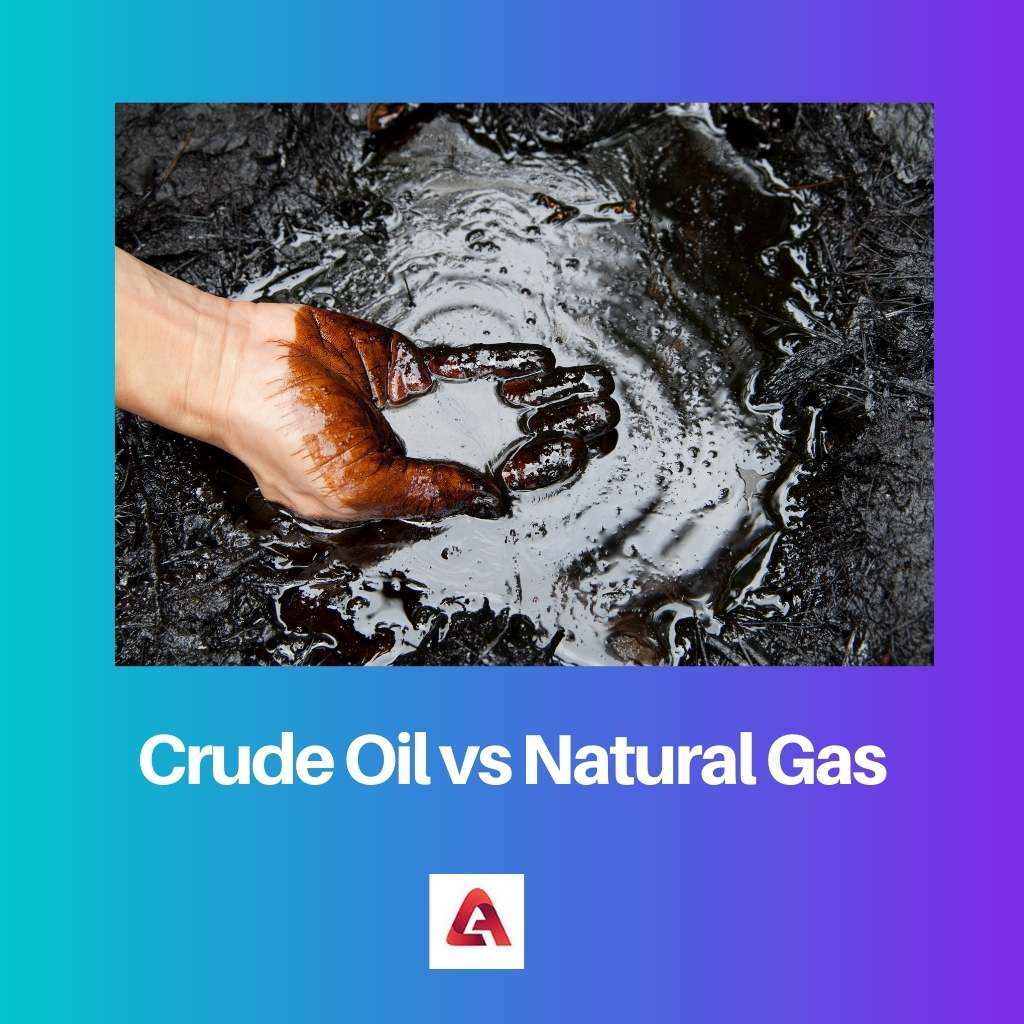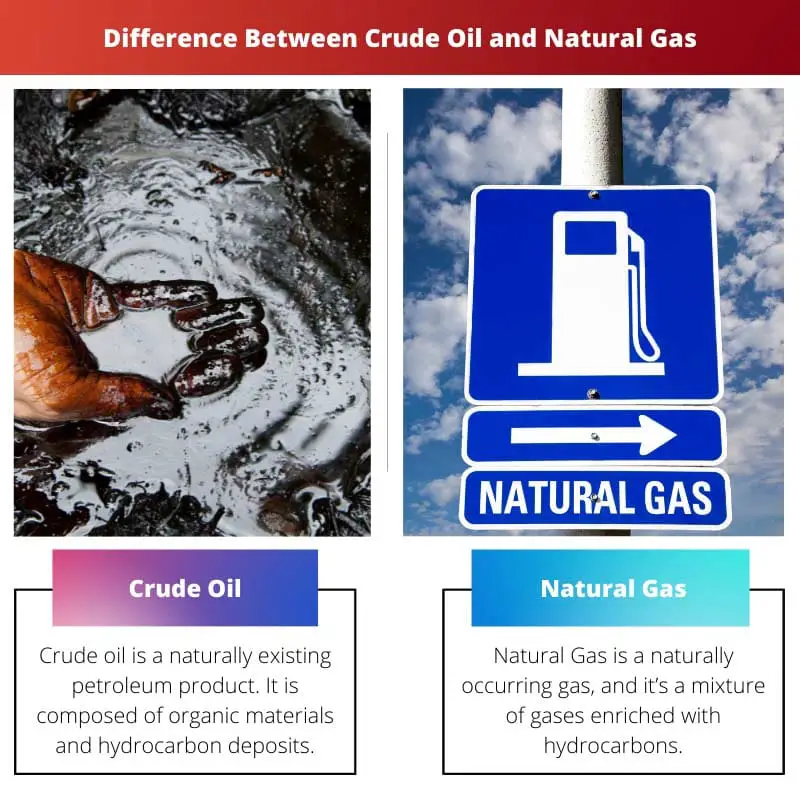Fossil fuels, when burnt, produce significant amounts of energy. The energy produced is beneficial and helps in powering vehicles and providing electricity.
Crude oil and natural gas are both fuels. They both get formed from decomposing animals and plants. Both of them are hydrocarbons found in the Earth’s crust.
Key Takeaways
- Crude oil consists of hydrocarbons in liquid form, while natural gas comprises gaseous hydrocarbons.
- Crude oil undergoes refining to produce gasoline, diesel, and other petroleum products; natural gas primarily serves as a fuel for heating and electricity generation.
- Natural gas contributes fewer greenhouse gas emissions than crude oil, making it a cleaner energy source.
Crude Oil vs Natural Gas
Crude oil is a mixture of comparatively volatile liquid hydrocarbons and it is a yellowish-black liquid found in natural underground reservoirs. Natural gas is a mix of hydrocarbons that exists as a gaseous state, and it is colorless but the flame burns with a blue color. It is also called fossil gas.

Crude oil is a naturally existing petroleum product. It is composed of organic materials and hydrocarbon deposits. Crude oil gets further refined to make several convenient products.
Diesel, Gasoline, and several other petrochemicals can get obtained by refining crude oil. Crude oil is a non-renewable resource (a limited resource).
Crude oil is composed of hydrogen, carbon, and some amounts of sulfur, oxygen, and nitrogen.
Natural Gas is a naturally occurring gas, and it’s a mixture of gases enriched with hydrocarbons. These gases exist naturally in the atmosphere.
Natural gas reserves exist deep within the earth’s crust near other hydrocarbon belts. It is mainly composed of methane, higher alkanes, and small amounts of nitrogen, hydrogen sulfide, carbon dioxide, and helium.
Comparison Table
| Parameters of Comparison | Crude Oil | Natural Gas |
|---|---|---|
| Composition | Crude oil is composed of solid hydrocarbons. | Natural Gas is composed of gaseous hydrocarbons. |
| Types | Sweet, sour, light, medium, heavy, and synthetic crude oils are types of crude oils. | Natural gas contains Ethane, Butane, Propane, and Pentane. |
| Other Derivatives | A few derivatives of crude oil are alkenes, paraffin wax, lubricants, and asphalt. | A few derivatives of natural gas are mid-stream natural gas and a few domestic uses. |
| Merit | Crude oil can be transported and stored easily. It is a dependable power source. | Natural gas produces less pollution. Natural gas is a non-renewable source. |
| Largest producer | The largest producer of Crude oil is Saudi Arabia. | The largest producer of natural gas is the United States. |
What is Crude Oil?
Crude oil acquired by drilling through the earth’s surface is the primary source of production of energy. The colour of crude oil depends upon its hydrocarbon composition.
The colour of crude oil scales from colourless to black. It is volatile and has a range of viscosity.
Crude oil can be sweet or sour depending on the level of sulfur present. Sweet crude has a sulfur content of 0.5 per cent, and sour crude has a 1 per cent sulfur content by weight.
Natural gas occurs with deposits of crude oil.
Crude oil can get characterized by the compound present in them. These compounds are paraffin, naphthenes, and aromatics.
Paraffin, the most common amalgam in crude oil, is a vital part of Gasoline. It is highly valued. Naphthenes are part of the liquid refiner products.
They even form hefty asphalt-like residues in the refining process. Aromatics constitute a small percentage of crude. The most common aromatic is benzene.
Crude oil first came across during the industrial revolution. It revolutionized the machines built during the 19th century. Today the world’s economy depends on crude oil (even referred to as black gold). Crude oil is utilized as fuel, and it is even used to form plastics, clothing, and gum.

What is Natural Gas?
Millions of years ago, the dead remains of plants and animals built up in deep layers on the piles of earth’s surface and sea beds, mixed with calcium carbonate, sand, and silt from time to time, got buried under rocks. The pressure and heat convert it to natural gas.
Natural gas is formed by two processes: biogenic and thermogenic. Sediments and landfills form biogenic natural gas, and thermogenic natural gas is created by buried organic material.
Natural gas is found dissolved in oil at high pressure. Natural gas was obtained as a by-product of the production of oil.
Natural gas is composed of methane and ethane. Both are in a gaseous state under high atmospheric conditions. Hexane, pentane, and propane are also found in small quantities in natural gas.
Natural gas is a clean fuel; the by-products of natural gas combustion are water vapour and carbon dioxide.
It is a colourless, odourless gas and highly flammable gas. For detection of early leaks, the sulfur odour is added.
It is a non-renewable source of energy. It is also used as fuel for vehicles, cooking, heating, and electricity generation.
Natural gas is even necessary for chemical products such as dyes and fertilizers. Natural gas is chief as it provides electricity to power plants.
It is versatile and abundant. It is preferable for the environment compared to other fossil fuels too.

Main Differences Between Crude Oil and Natural Gas
- Crude oil gets formed from a wide and distinct selection of complex hydrocarbons. Natural gas is made up of a gaseous mixture of hydrocarbons.
- Crude oil has a unique complex makeup. Natural gas is 80 per cent made up of one main component, methane.
- Crude oil needs extensive refinement to be commercially used. The simple structure of natural gas caters to its easier refining for commercial use.
- Crude oil, after refining, gets used for Jet fuel, propane, and diesel fuels. Natural gas gets utilized for commercial heating and electrical power generation.
- Liquefied petroleum gas (LPG) gets formed from crude oil. Compressed natural gas (CNG) gets formed from natural gas.




